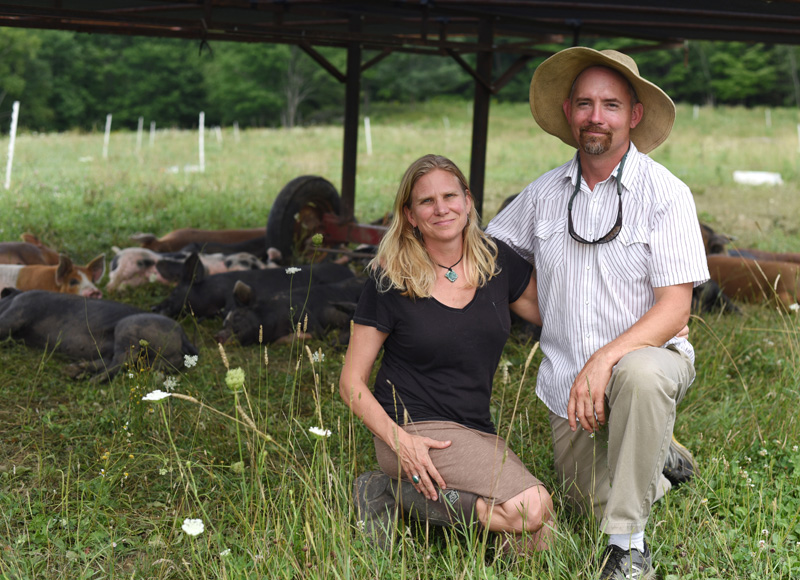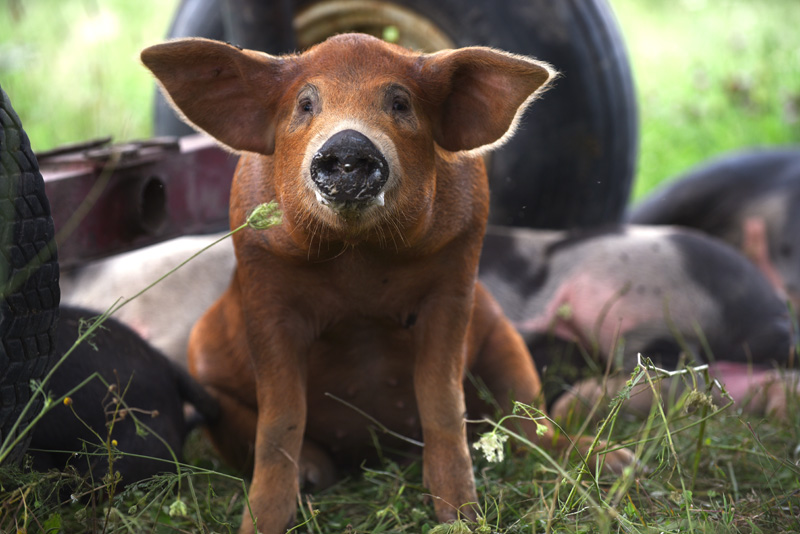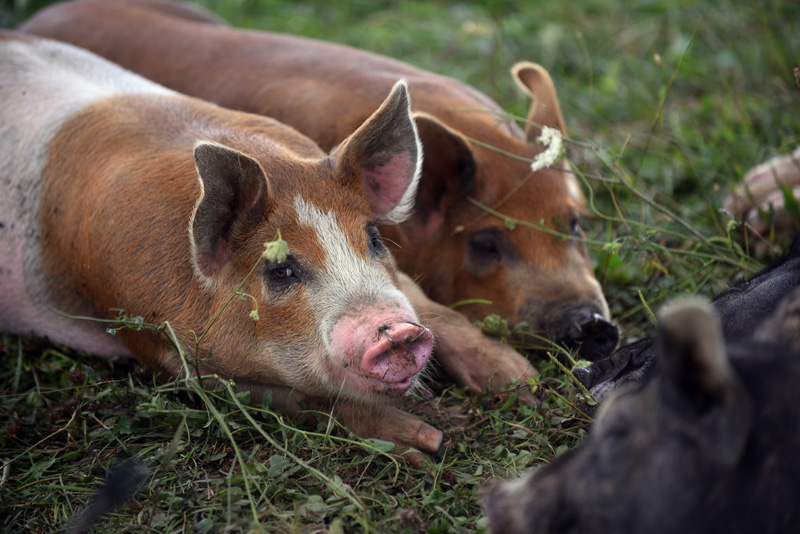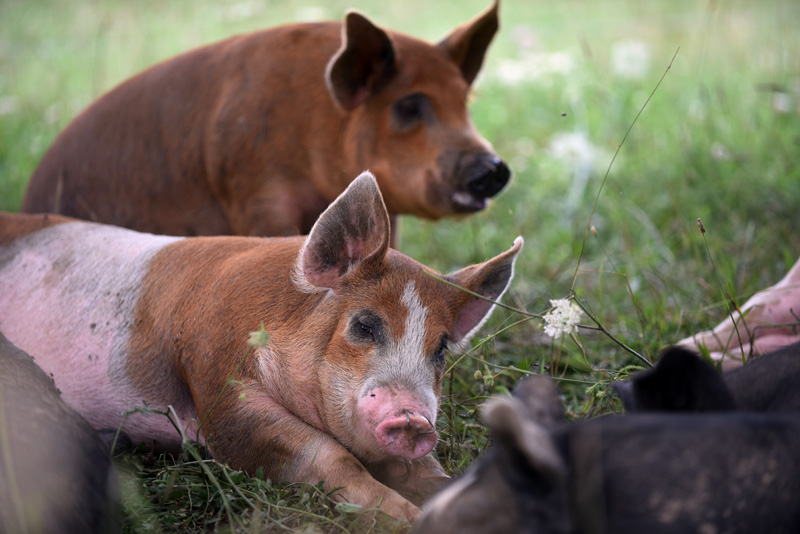
Holly and John Arbuckle with their pigs on Singing Prairie Farm in Newcastle, Wednesday, Aug. 8. (Jessica Picard photo)
Singing Prairie Farm, on the property of what was previously Dyer’s Valley Farm, on Holstein Lane in North Newcastle, is pasture-raising pigs for market with regenerative agriculture.
John and Holly Arbuckle started the farm eight years ago in La Plata, Mo., and relocated it to Newcastle on July 4.
The Arbuckles wanted a farm with barns to shelter the animals in cold weather, plus enough open pasture to “keep them with green grass under their feet as much as Mother Nature will let us,” John Arbuckle said.
The Arbuckle’s have two children, Noah, 10, and Zea, 7, who will attend Great Salt Bay Community School in Damariscotta.
The farm has around 45 pigs, a number the Arbuckles expect to grow. The farm has multiple breeds of heritage pigs, chosen for their ability to gain weight as they graze.
The Arbuckles use rotational or holistic grazing, allowing their pigs to roam throughout about 3/4 of an acre of pasture at a time, and then rotating them throughout the farm’s 174 acres.
“When you raise pigs this way, it’s better for them, because they are in a clean environment, they can move around, they are social, they’re in groups,” Holly Arbuckle said.
Once pigs are around 7 months old, they will be brought to Herring Brothers Meats in Guilford for harvesting.
According to the Arbuckles, not only is holistic grazing and regenerative agriculture humane and healthy for the pigs, and therefore good for pork consumers, but it is also good for the soil.
Singing Prairie Farm is part of the regenerative agriculture movement, which conducts farming and grazing in a manner that provides a range of environmental and social benefits, such as rebuilding degraded soil biodiversity.
This results in a carbon drawdown and improves the water cycle, according to Regeneration International, a nonprofit dedicated to building a global network of farmers, scientists, and others who practice and promote regenerative agriculture.

A 4-month-old pig sits at Singing Prairie Farm in Newcastle, Wednesday, Aug. 8. (Jessica Picard photo)
“We have the same amount of carbon in the world we always have,” Holly Arbuckle said. “The difference is that we have moved it out of the ground and into the air.
“When carbon dioxide settles into the ocean, it turns into carbonic acid, which is leading to overacidification of the oceans. The best place to put excess carbon is back into the land as organic matter.”
The Arbuckles are really “soil farmers,” she said.
“Our job is to make healthy soil, and our mechanism to that, our strategy to that, is pigs,” Holly Arbuckle said. “That’s the big picture. When you improve the soil, everything gets better.”
The Arbuckles take classes with Ray Archuleta and Gabe Brown, at Soil Health Consulting, and the Savory Institute.
“We’re farming in nature’s image,” John Arbuckle said.
“It’s better for the animals, it’s better for the land, it’s better for nutrition,” Holly Arbuckle said. “You are what you eat, and you are what your food ate.”
In the summer of 2017, Singing Prairie Farm received a Sustainable Agriculture Research and Education grant to test its meat. The results showed that the farm’s pork was higher in Omega 3’s than pork from factory farms.
The control group was pork from factory farms. Singing Prairie Farm also had groups of its own pigs on different diets.
One group of pigs was rotated on grass and given a full grain ration. Another group was on a half-ration of grain and was fed foraged crops, such as peas, kale, and forage oats.
“It looked like a salad bar,” John Arbuckle said. “(The pigs) would run in there just like a bunch of vegetarian piranhas.”

A pig at Singing Prairie Farm in Newcastle, Wednesday, Aug. 8. (Jessica Picard photo)
The last group was not given grain, and ate only vegetables and other green matter.
“The more vegetables they ate, and the more green matter they ate, the higher the Omega 3’s went,” Holly Arbuckle said.
“We are going to continue doing research on that,” Holly Arbuckle said.
While they might sell pork locally in the future, Singing Prairie Farm mostly sells pork wholesale to online vendors like Butcher Box, Vital Choice, and Serenity Kids.
One of its most popular items is the Roam Stick, a hickory-smoked pork stick billed as the only non-GMO, pasture-raised pork stick. It is free of gluten, dairy, antibiotics, growth hormones, artificial flavors, preservatives, red dye, corn syrup, artificial sweeteners, MSG, nitrates, and encapsulated citric acid.
Due to high demand, Singing Prairie Farm now partners with other independent farms in the country to create the product, which is available online at websites including roamsticks.com and Amazon.com.

Pigs lie under shelter at Singing Prairie Farm in Newcastle, Wednesday, Aug. 8. (Jessica Picard photo)
“As we expand, we will be looking for other farmers who are willing to grow pork in a way that is both organic and regenerative,” Holly Arbuckle said.
Larry Russell, whose father started Dyer’s Valley Farm in the 1950s, said the decision to put the farmland on the market two years ago was a result of multiple factors, such as the low price of milk and not having anyone interested in taking over the dairy farm.
“I just wanted to do something different,” Russell said. “It’s nice that it’s going to stay in agriculture.”
The area, fondly called Cowshit Corner by locals, even has a song dedicated to the farm, performed by local musician Steve Jones.
The song was the theme of “Cowshit Corner,” a reality TV show that featured Russell and friends at the “Cherch of the Holy Cow,” an informal weekly gathering on the farm that involved drinking beer and discussing current events. A few episodes of the show were directed by Newcastle resident Keith O’Leary, who marketed it to cable networks.
Russell, who spends six months of the year in Florida, said he is not sure yet what he will do when he returns to Maine next summer.

Pigs lie down at Singing Prairie Farm in Newcastle, Wednesday, Aug. 8. (Jessica Picard photo)
“Half of what we do is part of promoting a cause, and our cause is regenerative agriculture,” Holly Arbuckle said. “And the business is, how do we support not only our farm, but also other farms?”
The farm may offer eggs from pasture-raised chickens in the future, according to Holly Arbuckle.
The farm has been approved as a hub farm candidate by the Savory Institute, an international group of regenerative farmers propelling research, outreach, and education.
Savory Hubs serve as demonstration sites, and can also offer holistic management courses, events, training, consulting, Savory programs, and special projects, according to the Savory Institute’s website.
Singing Prairie Farm does not offer courses at the moment, but Holly Arbuckle said the farm will conduct research and engage in education and outreach after it is accredited within the next year.
The farm will be the first Savory Hub farm in Maine, and the first Savory Hub farm to focus on pig production, according to Holly Arbuckle.
The farmland has also been recently certified organic through the Maine Organic Farmers and Gardeners Association.
For more information, see singingprairiefarms.com and roamsticks.com, or follow the farm on Instagram. To contact Singing Prairie Farm, email john@roamsticks.com.
“There are already a lot of people here that are very excited about the environment and food,” Holly Arbuckle said. “So it’s really great to be in a place where there’s already so much happening.”



